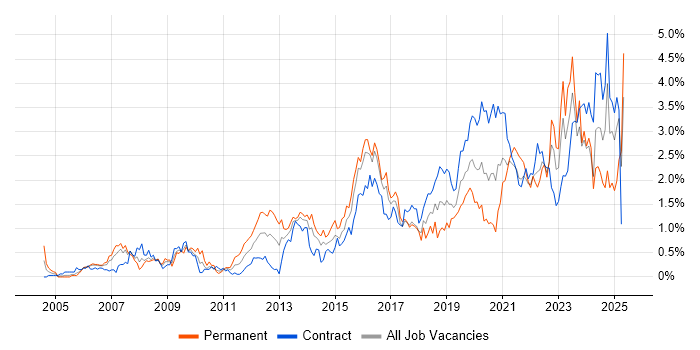Infrastructure Engineering
Scotland > Glasgow
The table below provides summary statistics and salary benchmarking for jobs advertised in Glasgow requiring Infrastructure Engineering skills. It covers permanent job vacancies from the 6 months leading up to 13 February 2026, with comparisons to the same periods in the previous two years.
| 6 months to 13 Feb 2026 |
Same period 2025 | Same period 2024 | |
|---|---|---|---|
| Rank | 47 | 57 | 124 |
| Rank change year-on-year | +10 | +67 | -32 |
| Permanent jobs citing Infrastructure Engineering | 10 | 8 | 39 |
| As % of all permanent jobs in Glasgow | 1.37% | 1.27% | 2.15% |
| As % of the Processes & Methodologies category | 1.79% | 1.36% | 2.25% |
| Number of salaries quoted | 7 | 6 | 37 |
| 10th Percentile | £42,000 | £39,375 | - |
| 25th Percentile | - | £44,688 | £25,200 |
| Median annual salary (50th Percentile) | £45,000 | £60,000 | £45,000 |
| Median % change year-on-year | -25.00% | +33.33% | -9.68% |
| 75th Percentile | £50,000 | £66,875 | £52,500 |
| 90th Percentile | £55,000 | £69,375 | £61,000 |
| Scotland median annual salary | £50,000 | £55,000 | £47,557 |
| % change year-on-year | -9.09% | +15.65% | +0.12% |
All Process & Methodology Skills
Glasgow
Infrastructure Engineering falls under the Processes and Methodologies category. For comparison with the information above, the following table provides summary statistics for all permanent job vacancies requiring process or methodology skills in Glasgow.
| Permanent vacancies with a requirement for process or methodology skills | 559 | 590 | 1,733 |
| As % of all permanent jobs advertised in Glasgow | 76.47% | 93.65% | 95.64% |
| Number of salaries quoted | 354 | 257 | 588 |
| 10th Percentile | £29,000 | £35,000 | £26,250 |
| 25th Percentile | £30,438 | £41,000 | £36,250 |
| Median annual salary (50th Percentile) | £50,000 | £57,500 | £50,000 |
| Median % change year-on-year | -13.04% | +15.00% | -4.76% |
| 75th Percentile | £66,875 | £76,250 | £64,750 |
| 90th Percentile | £85,000 | £100,000 | £75,000 |
| Scotland median annual salary | £45,000 | £55,000 | £50,000 |
| % change year-on-year | -18.18% | +10.00% | -13.04% |
Infrastructure Engineering
Job Vacancy Trend in Glasgow
Historical trend showing the proportion of permanent IT job postings citing Infrastructure Engineering relative to all permanent IT jobs advertised in Glasgow.

Infrastructure Engineering
Salary Trend in Glasgow
Salary distribution trend for jobs in Glasgow citing Infrastructure Engineering.

Infrastructure Engineering
Salary Histogram in Glasgow
Salary distribution for jobs citing Infrastructure Engineering in Glasgow over the 6 months to 13 February 2026.
Infrastructure Engineering
Co-Occurring Skills & Capabilities in Glasgow by Category
The following tables expand on the one above by listing co-occurrences grouped by category. They cover the same employment type, locality and period, with up to 20 co-occurrences shown in each category:
